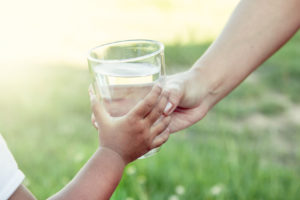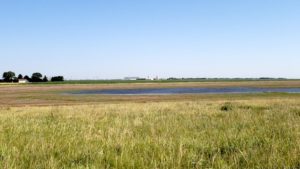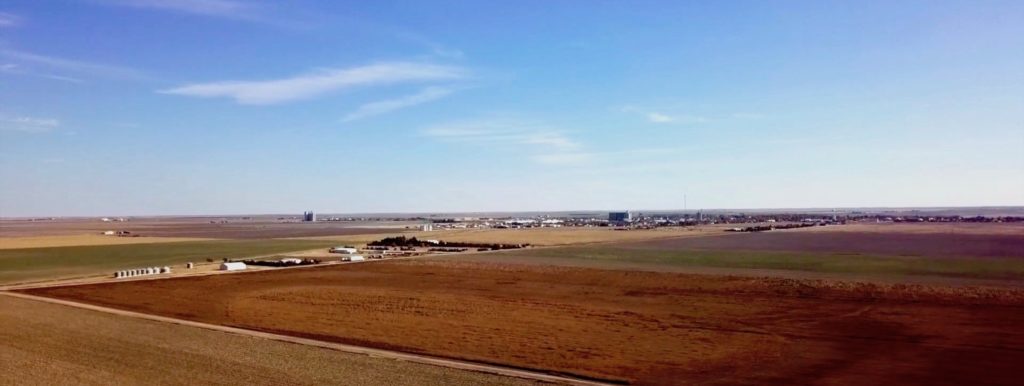Connecting People, Playas & the Ogallala Across Generations
Playas are a primary source of groundwater recharge and should be an important part of a sustainable approach to securing water for communities in western Kansas. Throughout the region, aquifer levels are decreasing, and because most small towns depend on the Ogallala Aquifer for their water, their future water supply and the future of their communities are at risk. Many of these towns are finding solutions to continue providing abundant and clean water for residents — and playas are a big part of those solutions.
Benefits from Playas
More Water
Groundwater recharge is a continuous process; the water recharging through playas today will be available for use by future generations. In fact, a healthy, functioning system of playas can provide high-quality water to help support the needs of a small town. Playas across the region recharge at an average rate of about three inches per year * — that’s three inches of water the size of the playa moving toward the aquifer each year. For instance, a four-acre playa, which is a very small one, sends an acre-foot of water toward the aquifer each year. That’s 325,851 gallons of water, more than enough to supply a couple of families for a year.
*Gurdak and Roe, 2009. This report provides a review of all the playa studies with calculated recharge rates up to 2009. Three inches is an approximate average. Recharge rates beneath individual playas vary considerably — up to 10 inches per year — based on a number of factors including depth to aquifer, soil type, amount of soil saturation, evaporation and transpiration, and amount of rainfall. Recharge rates also vary during the playa wet/dry cycle.
Cleaner Water
 The benefit goes beyond simple recharge; playas clean the water as it travels toward the aquifer. Studies show that water reaching the aquifer through playas is of higher quality. This happens in two ways: first, as rainfall and runoff travel toward the playa, the surrounding grasses trap sediments, which can carry contaminants into the playa; then, as the water moves through the clay floor of the playa, a second ‘cleaning’ process occurs as the soils beneath the playa remove nitrates and other dissolved contaminants.
The benefit goes beyond simple recharge; playas clean the water as it travels toward the aquifer. Studies show that water reaching the aquifer through playas is of higher quality. This happens in two ways: first, as rainfall and runoff travel toward the playa, the surrounding grasses trap sediments, which can carry contaminants into the playa; then, as the water moves through the clay floor of the playa, a second ‘cleaning’ process occurs as the soils beneath the playa remove nitrates and other dissolved contaminants.
Recreational and Educational Opportunities
Healthy playas provide habitat for wildlife and recreational activities for the local community. Wet playas attract thousands of ducks, geese and a variety of shorebirds during migrations, providing opportunities for local hunting, birdwatching, and nature study. Also, playas are a living laboratory where people can learn about wetlands, geology and the history of the region.
What Your Community Can Do
Communities can proactively address a declining municipal water supply by assisting with irrigation water conservation, better surface water management, and playa restoration and protection. Once water use has been reduced, healthy playas provide a sustainable source of future water.
 Playa restoration prescriptions include filling pits, ditches, and diversions that keep water from getting to and filling a playa, removing excess sediment, installing native shortgrass buffers to keep sediment out, and managing surface water runoff to flow into playas. Low-tech, low-cost solutions for increasing the amount of water flowing through playas — while limiting sediments and impurities — are available. By allowing rain and runoff to flow to the lowest point in the watershed, usually a playa, towns can keep roads and property from flooding while increasing the amount of groundwater recharge.
Playa restoration prescriptions include filling pits, ditches, and diversions that keep water from getting to and filling a playa, removing excess sediment, installing native shortgrass buffers to keep sediment out, and managing surface water runoff to flow into playas. Low-tech, low-cost solutions for increasing the amount of water flowing through playas — while limiting sediments and impurities — are available. By allowing rain and runoff to flow to the lowest point in the watershed, usually a playa, towns can keep roads and property from flooding while increasing the amount of groundwater recharge.
It is also important to manage water use. Although playas are a primary source of recharge, withdrawals from irrigation greatly exceed recharge from playas. However, some towns and individuals have found that when irrigation near municipal and domestic wells is reduced or turned off, water levels in the aquifer rebound. Around the region, people are talking about and experimenting with how to lessen the amount of water used for irrigation (see story about Sheridan County Local Enhanced Management Area) and are using state and federal programs, which offer technical and financial support, to increase irrigation efficiency and retire irrigation wells near towns and municipal wells. Working with your local Soil and Water Conservation District and Groundwater Management District is a good place to start.
How You Can Participate
There are many conservation programs available to help agricultural producers and landowners voluntarily restore playas, reduce water use, and convert from irrigation-based to dryland farming. Our partnership can work with communities to develop a restoration plan for the playas that feed the aquifer underneath town and domestic wells. This plan will identify opportunities, such as grant programs, to protect healthy playas and conduct restoration work for those that have been modified. Learn more about playa conservation programs.
More Information about the Partnership
A diverse group of partners are working together to expand water conservation efforts in western Kansas. The partnership includes local landowners, Ducks Unlimited, Kansas Alliance for Wetlands and Streams, Kansas Association of Conservation Districts, Kansas Department of Agriculture, Kansas Department of Health and Environment, Kansas Department of Wildlife and Parks, Kansas Farm Bureau, Kansas Groundwater Management District #1, Kansas Water Office, Pheasants Forever, Playa Lakes Joint Venture, Towns of Leoti and Tribune, USDA Farm Service Agency, USDA Natural Resources Conservation Service, Wichita County Conservation District, Wichita County Economic Development, and Wichita County Water Conservation Area.
For more information about the partnership or playa conservation opportunities for your community, contact one of the representatives listed below.
DAN MEYERHOFF, Kansas Association of Conservation Districts
785-650-1330 | kacd@eaglecom.net
MATT SMITH, Playa Lakes Joint Venture
785-420-7000 | matt.smith@pljv.org
MATT HOUGH, Ducks Unlimited
308-850-2717 | mhough@ducks.org

